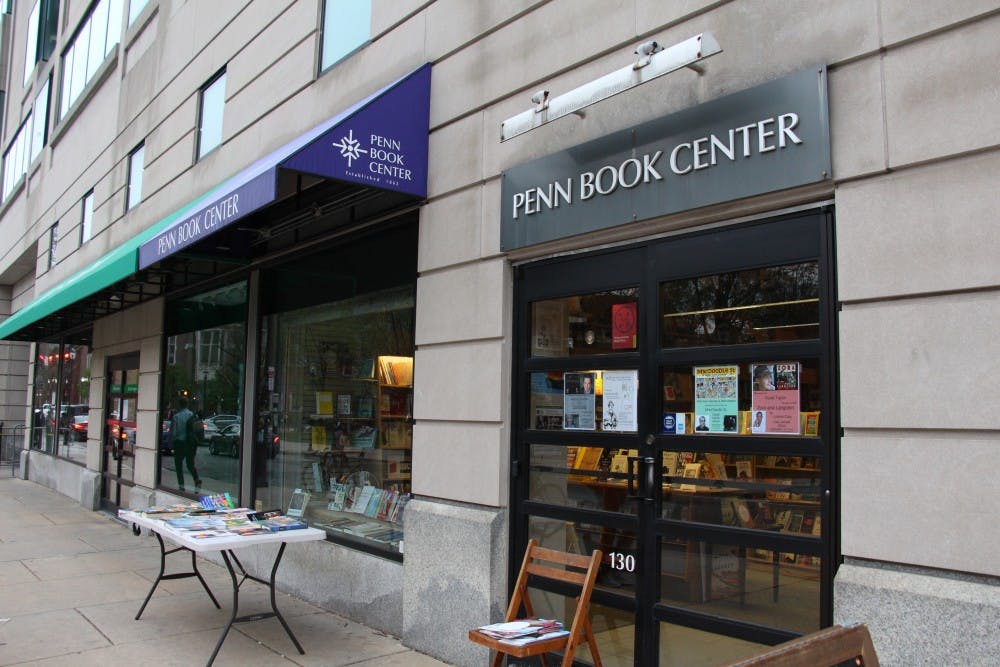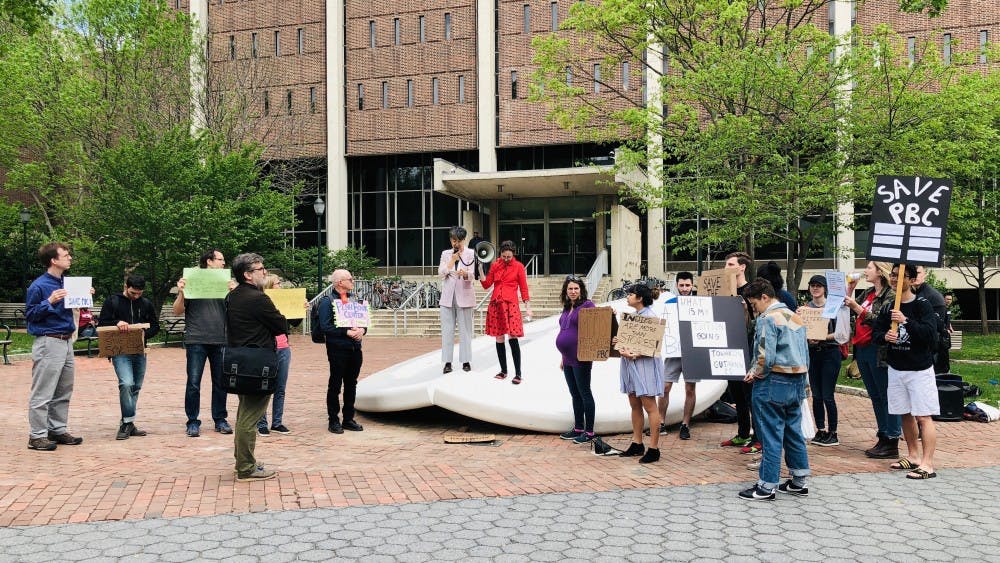
The Penn Book Center, located on 34th Street between Walnut and Sansom streets, has been open since 1962.
Credit: Tamara WurmanWhen the spire of Notre-Dame Cathedral caught fire last month, Le Monde and other news outlets were quick to quote a passage from Victor Hugo’s 1831 novel, Notre-Dame de Paris (known to Disney fans as The Hunchback of Notre Dame). The French novelist’s lines seemed prescient, even prophetic: “All eyes were raised to the top of the tower. What they saw was extraordinary. On the top of the highest gallery, higher than the central rose-window, rose a great flame between the two bell towers with swirls of sparks, a great, ragged, furious flame, from which at times the wind would snatch a strip into the smoke.”
Hugo was invoked again in the controversy that followed the cathedral fire. When French billionaire (and Salma Hayek’s spouse) François-Henri Pinault pledged 113 million dollars toward the church’s reconstruction, some critics used the titles of Hugo’s most famous novels to ask, “Notre-Dame de Paris, fine, but what about Les Misérables?” — i.e. why not use that money to help the poor? Controversy over the allocation of funds continues, with some citing Notre-Dame cathedral’s global symbolic importance, some giving precedence to human lives, and a third group weighing in to say that it’s a false economic choice that pits the preservation of culture against addressing the urgent ills of homelessness.

In any case, debates arise whenever there are limited resources. This is even true here, closer to home, where faculty, staff, and students read poetry aloud at the Button last week to protest the imminent closure of the independent Penn Book Center, located at 34th and Sansom. A Change.org petition started by Chi-ming Yang, Associate Professor of English at Penn, cites Princeton University’s subsidies of an independent campus bookstore and asks Penn to consider ways to keep the Penn Book Center viable as a cultural center that supplements the offerings of Barnes & Noble and Amazon with more carefully-curated selections and events tailored to the University City community. The petition so far has been signed by over 5,000 supporters who want to preserve this vital site of intellectual and artistic exchange between the campus and off-campus communities of Philadelphia.
What does the Penn Book Center have to do with Notre-Dame de Paris? The answer lies not in the fiery dénouement of Hugo’s novel, but in his earlier chapter “Ceci tuera cela,” or “This Kills That.” In that famous chapter, “that” refers to buildings and “this” refers to books; the former will inevitably be replaced by the latter just as, after the invention of the printing press and the 1455 publication of the Gutenberg Bible, books replaced architecture as the primary expression and repository of human culture. Notre-Dame de Paris is set during the 15th-century moment of that shift, but Hugo wrote his novel in the post-revolutionary era of 1831 France, so he gives that fundamental shift (from building to book) important political overtones: the printing press allowed for a wide democratization of knowledge through the paradoxical staying power of paper over stone. Books enable a revolutionary vision of “emancipated mankind,” throwing off the shackles of religious superstition and monarchical authority. Liberty replaces unity; as Hugo writes, “The invention of printing is the greatest event in history. It is the mother of revolutions.”
Hugo then goes even further, developing a long analogy between the history of architecture and that of books, both of which progress from top-down order to exuberant, collective freedom. In architecture, Hugo decries the soulless, sterile lines of neoclassical temples. He prefers the more monstrously vibrant Gothic structures, which combine collective effort (the Cathedral of Notre-Dame took over 200 years to construct) with the individual imprint of humble stonecutters, who snuck their own quirky self-portraits onto gargoyle-decked towers and sculpted façades. That democratic energy is what made the Notre-Dame cathedral in Paris worth preserving (both in the pages of Hugo’s novel and through the governmental committee that he joined to save the national architectural patrimony). But it also reminds us why an independent bookstore like the Penn Book Center is so central to the preservation and continuation of culture. Its book-stocking decisions are local and responsive, not centralized or top-down like those of a corporate chain. If “classical temples,” in order to profit, reinforce uniformity, sites like the Penn Book Center allow for the exuberant collectivity and individual imprints that Hugo praised in Notre-Dame de Paris. The personal touch makes an experiential difference, as anyone who has attended a poetry reading or book event at the Penn Book Center can attest.
Right next to our campus, we have a vibrant and dynamic community in line with Hugo’s vision of democratic book culture: “[T]his too is a construction which grows and rises in endless spirals; there too is a medley of tongues, ceaseless activity, tireless labour, unremitting assistance from the whole of mankind, the refuge promised to intelligence against a new Flood, against submersion by the barbarians.” If you want to add your voice to that human medley of tongues, go today to buy something at the Penn Book Center. They might even have a copy of Hugo’s novel on their shelves!
ANDREA GOULET is a professor of French and Francophone Studies at the University of Pennsylvania and co-chair of the Nineteenth-Century French Studies Association. She is the author of Optiques: the Science of the Eye and the Birth of Modern French Fiction (Penn, 2006) and Legacies of the Rue Morgue: Space and Science in French Crime Fiction (Penn, 2016). She recently co-edited a volume on the "BBC Canada Sci Fi cloning television series, Orphan Black: Performance, Gender, Biopolitics" (Intellect Press, 2018).
The Daily Pennsylvanian is an independent, student-run newspaper. Please consider making a donation to support the coverage that shapes the University. Your generosity ensures a future of strong journalism at Penn.
Donate



